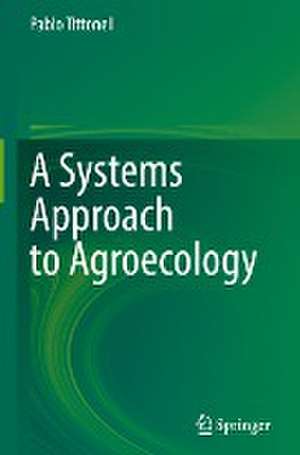A Systems Approach to Agroecology
Autor Pablo Tittonellen Limba Engleză Hardback – 14 oct 2023
Preț: 958.38 lei
Preț vechi: 1168.76 lei
-18% Nou
Puncte Express: 1438
Preț estimativ în valută:
183.44€ • 199.33$ • 154.19£
183.44€ • 199.33$ • 154.19£
Carte disponibilă
Livrare economică 31 martie-14 aprilie
Preluare comenzi: 021 569.72.76
Specificații
ISBN-13: 9783031429378
ISBN-10: 3031429370
Pagini: 393
Ilustrații: XX, 393 p. 1 illus.
Dimensiuni: 155 x 235 mm
Greutate: 0.82 kg
Ediția:1st ed. 2023
Editura: Springer Nature Switzerland
Colecția Springer
Locul publicării:Cham, Switzerland
ISBN-10: 3031429370
Pagini: 393
Ilustrații: XX, 393 p. 1 illus.
Dimensiuni: 155 x 235 mm
Greutate: 0.82 kg
Ediția:1st ed. 2023
Editura: Springer Nature Switzerland
Colecția Springer
Locul publicării:Cham, Switzerland
Cuprins
Prologue
Part 1: System definition
1. Introduction: why agroecology, why systems, why now?
2. The agroecosystem
Part 2: Analysis-oriented approaches
3. Analysing the structure and diversity of agroecosystems
4. Categorising diversity through rural household typologies
5. Production functions and factors in agroecosystems
6. Landscape structure, functions and biodiversity
7. Spatial heterogeneity in agroecosystems
Part 2: Design-oriented approaches
8. Indicators and evaluation in agroecological design 9. Trade-offs around production and livelihood decisions
10. Pathways for agroecological transitions
Part 1: System definition
1. Introduction: why agroecology, why systems, why now?
2. The agroecosystem
Part 2: Analysis-oriented approaches
3. Analysing the structure and diversity of agroecosystems
4. Categorising diversity through rural household typologies
5. Production functions and factors in agroecosystems
6. Landscape structure, functions and biodiversity
7. Spatial heterogeneity in agroecosystems
Part 2: Design-oriented approaches
8. Indicators and evaluation in agroecological design 9. Trade-offs around production and livelihood decisions
10. Pathways for agroecological transitions
Notă biografică
Prof. Pablo Tittonell is the holder of the Agroecology and Sustainable Landscapes Chair at the University of Groningen, the Netherlands, and Senior researcher at CIRAD, France. His expertise includes agroecology, soil fertility and biodiversity, and focuses on human-nature interactions in multifunctional landscapes and their adaptation to global change
Textul de pe ultima copertă
As agroecology gains momentum in the international research-for-development arena, there is an urgent need for methods and tools to support the co-design and evaluation of agroecological systems and their transitions. The social and ecological complexity of agroecosystems, their dynamics, uncertainties and sustainability, calls for an holistic, systemic approach to agroecology, which leads to questions such as: how do we deal with heterogeneity, landscapes, biodiversity or learning processes in agroecosystems analysis? How do we categorize diversity or analyse trade-offs in social-ecological interactions? How do we conceptualize, co-design and monitor agroecological transitions? This book sets out to answer these questions by building on the valuable ‘classics’ in agroecology. The book presents a systems perspective that underpins a combination of methodologies, ranging from participatory tools and field observations to mathematical simulation modelling. Researchers, advanced students and transdisciplinary practitioners will find in this book insights and methods to design research and (co-) innovation processes to foster agroecological transitions.
Caracteristici
Presents systems approaches at the farm, landscape and food system levels
Provides guidance on participatory tools, field experiments and modelling
Delivers insights for advanced students, researchers and practitioners
Provides guidance on participatory tools, field experiments and modelling
Delivers insights for advanced students, researchers and practitioners
